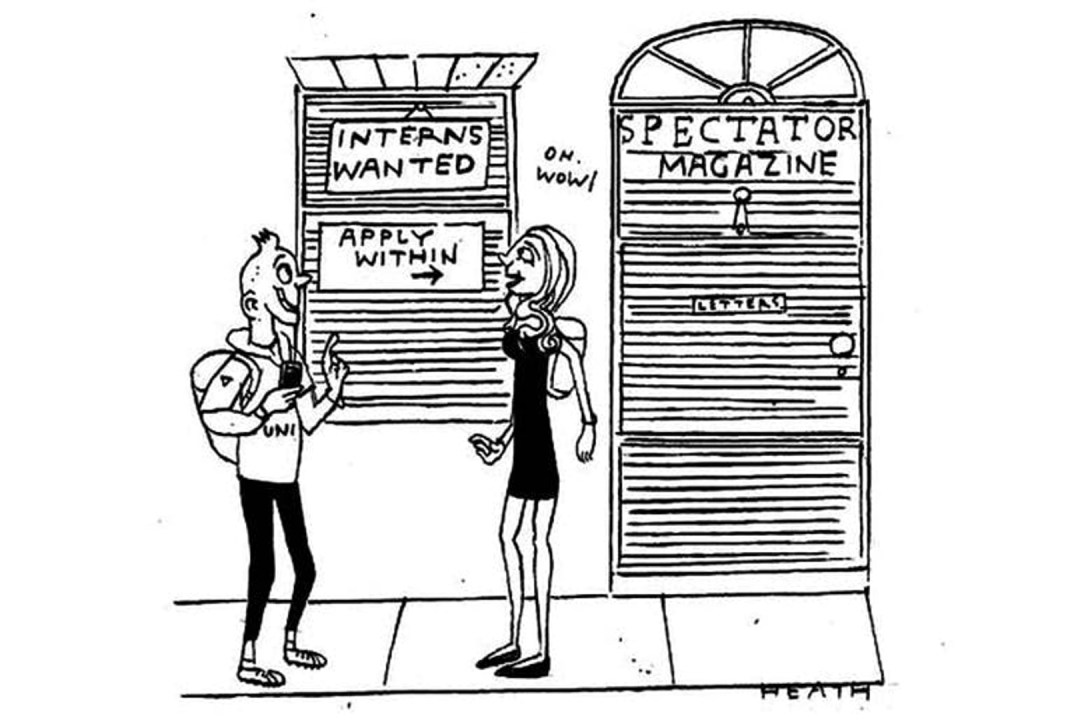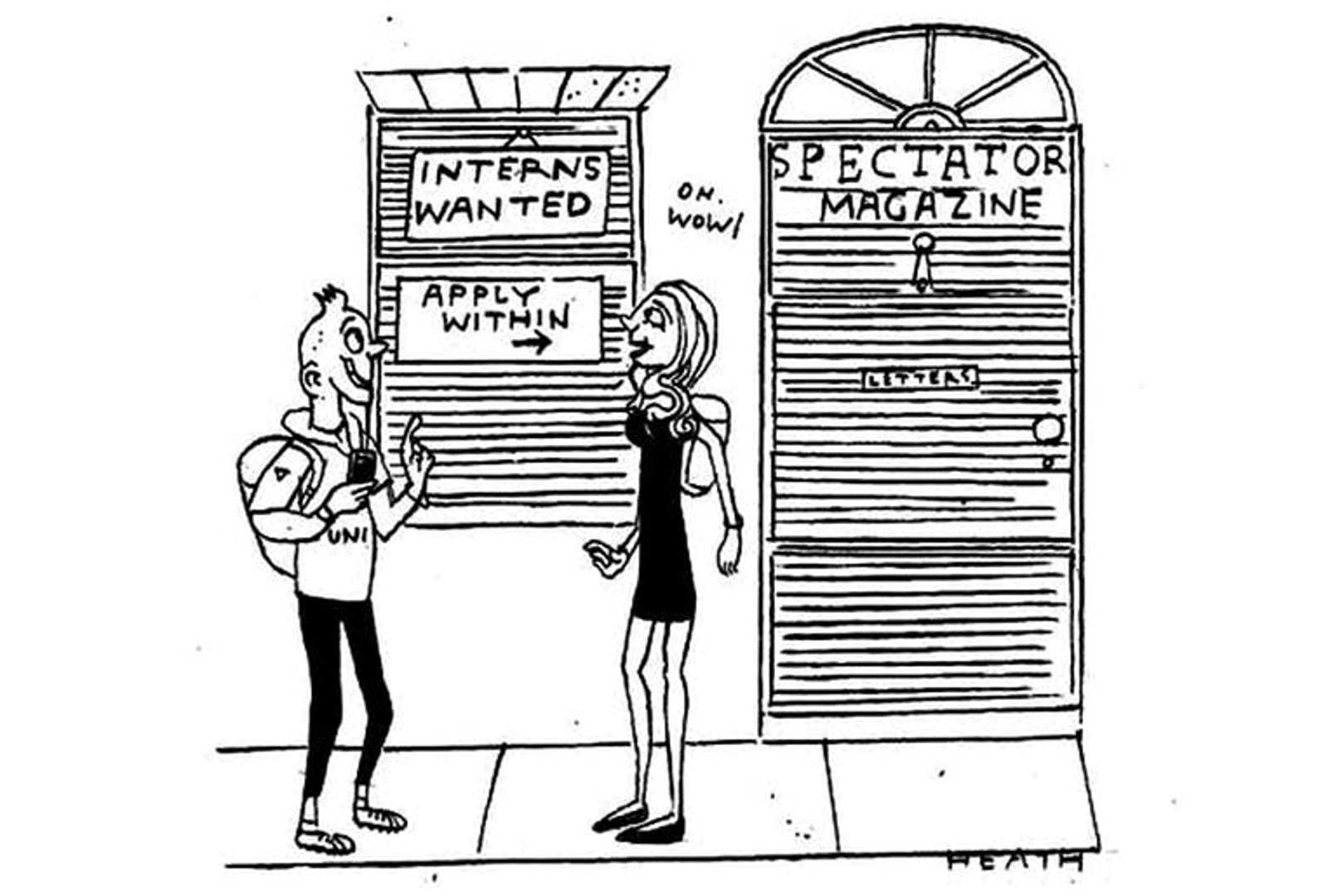The Spectator’s internship scheme for 2021 is now open. It’s CV-blind and name-blind: we don’t ask about where (or whether) you went to university. We don’t ask about your age, nationality or immunological status. We don’t even ask your name: we anonymise all entries. In journalism, all that matters is whether you can do the job. The Spectator is growing and we’re looking for talent: when vacancies arise, we normally think back to recent interns. Our internship scheme pays (but not very much) and we even provide help with accommodation for those who need it.
Internships are normally the first casualties of lockdowns and social distancing orders. We pressed ahead with our scheme last year and will do so again if the law allows. We cannot afford not to: The Spectator will only ever be as good as the people who work for it. We need to cast as wide a net as possible to find people.
We are not looking for writers: at 22 Old Queen Street, we commission and edit. Unlike newspapers, we do not have staff writers. Almost all of the magazine is, and always has been, written by outsiders. We often recruit from our internship scheme: Cindy Yu (our broadcast editor), Max Jeffrey (her deputy), John Connolly (news editor), Gus Carter (online comment editor) and Joanna Rossiter (a Spectator Life editor) all first came through our doors as interns. Because we see this as a recruitment tool, we ask you not to apply if you have two or more years of education to run.
To apply for the magazine internship, answer at least two questions from part A and at least one question from part B:
Part A:
- Name three ways we could improve our magazine and three in which we could improve the website.
- Suggest five people to get for either a diary or an interview – and any ideas how you would get them
- Suggest a cover story, and some potential authors
- Rewrite any Bill Cash speech as a pithy 500-word article.
- Write a 300-word blog for Spectator Life or Coffee House
- How can we build a bigger audience for our podcasts?
Part B:
- Will the closure of offices since last March have impacted social mobility? Explain your answer.
- Find two factual errors in an OpEd of your choice.
- Which publication has the highest proportion of privately-educated journalists? Give evidence and show your workings in a 300 word piece
- Which former Labour leader (dead or alive) could win an election for the party now? Explain in a 300-word blog
- How have the lives of politicians been different to the public during the pandemic? Explain in a 300 word blog
- If Neil O’Brien MP’s “Covid sceptic” website had an entry on him, written in the same style as the entries on academics who have challenged the government, what would it say?
- Based on election data, which section of Scottish voters should the unionist campaign focus on?
If you wish to apply for a data internship, then please replicate any three of The Spectator’s data hub grabs using Datawrapper – and make it auto-updating. If you’re a dab hand at data, and looking for freelance work, get in touch (especially if you’re familiar with Google Analytics) we have a mound of work right now. Just email me direct.
To apply for a broadcast internship, under Cindy Yu, do one of the below tasks:
- Produce and present a short podcast (max seven minutes) on a session of PMQs – pick out the highlights, play the clips, and explain what’s going on.
- Produce and present a short video explaining a news story you have seen.
And at least two of the below tasks:
- List potential podcast guest line-ups for three stories found from recent issues of The Spectator (one must be current affairs). Briefly explain why you chose each guest.
- Write podcast scripts introducing three stories found from recent issues of The Spectator.
- Suggest three ways in which we can improve our social media outreach for both podcasts and TV
- Point to at least one thing we’re doing wrong with our current podcasts / Spectator TV.
- Suggest ways we can improve our discoverability on various platforms, including smart-speakers
- Suggest three outro songs for three different episodes of Coffee House Shots. (No Eurovision songs pls).
Send your answers with a covering letter to internship@spectator.co.uk. Please write in the subject line which internship you are applying for. The deadline for applications is 11 June but early applications are encouraged. I’d urge those who didn’t get through last time to have another go. The difference between the dozen we select and the next – say – 50 is agonisingly small.
If you’re reading this and thinking ‘people like me don’t get internships like this’, then think again. That’s what Katherine Forster thought when, age 47 with grown-up kids, she applied. She went to start a journalism career, is now at the Sunday Times and is soon off to GB News. When we started no-CV system, we found two surprises: one is the variety of the age of applicants. Next: the number of people seeking a career change and who interned for us during their holidays.
Similarly, if you left school before or during sixth-form – due to lockdown or related chaos – then give it a go. Say so in your letter. Not everyone’s life runs in a straight direction, which is why employers who recruit by CVs miss out a lot of talent. But we do things differently. This is perhaps why our sales have doubled over the last ten years in a magazine market that has halved. It’s a product of the mix of people we have here and explains why we put so much effort into internships.
No one else goes to the trouble of anonymising and judging 200-odd applications (the top 50 are marked by three senior journalists). To have been accepted on the Spectator scheme increases your chances elsewhere.
Frank Johnson, a former editor, left school aged 16 (as did Danielle Wall, now The Spectator’s managing editor). We’re looking for passion and ability. This is not about social engineering: no one is marked up or down for circumstances of birth. Oxbridge students, please resist the urge to self-identify in your letter (“I edited my student magazine, Cherwell…”). No talk about going “up” to university. No talk of university at all, unless it’s a journalism postgrad. The courses are worth mentioning as they demonstrate commitment – and anyone serious about journalism will need a lot of that.)
What we do ask is that you’re (at most) two years away from looking for a job (i.e., no first-year students on three-year degrees). Applications are especially welcome from anyone whose life trajectory was derailed by events since March 2020. If you’re offered an internship but then get a job, please free up the slot for someone else.
NOTE: Interns typically spend five days in the office and will be asked to do a wide range of tasks, including some menial ones (which all of us do at The Spectator). If this puts you off, don’t apply! Remedial support is available for PPE students.
This article is free to read
To unlock more articles, subscribe to get 3 months of unlimited access for just $5









Comments
Join the debate for just £1 a month
Be part of the conversation with other Spectator readers by getting your first three months for £3.
UNLOCK ACCESS Just £1 a monthAlready a subscriber? Log in